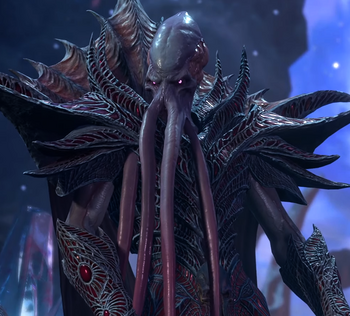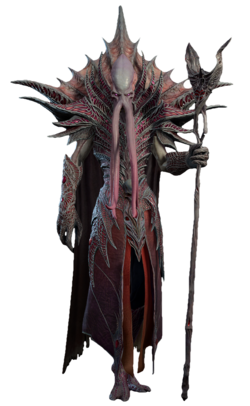Ad placeholder
The Emperor
| The Emperor | |||||||
|---|---|---|---|---|---|---|---|

| |||||||
| Stats | |||||||
| Level 12 | |||||||
| |||||||
| [[Mind Flayer|Mind Flayer]] | |||||||
| Aberration | |||||||
| 140 | |||||||
| 18 | |||||||
| 30 ft | |||||||
| Medium | |||||||
| 120 lbs | |||||||
| 2 | |||||||
| Character information | |||||||
| Location | Astral Prism | ||||||
| Enemies | Absolute, Ketheric Thorm, Enver Gortash, Orin the Red | ||||||
| Model | |||||||

| |||||||
This page is in the process of being constructed or reformatted. You are welcome to contribute as well. Last edited on 2023-09-01. If multiple days have passed since, this template should be removed. |
Spoiler warning: The following content contains unhidden spoilers. Read at your own risk. |
The Emperor, is a Mind Flayer NPC that appears in Baldur's Gate 3. He acts as a guide, and unlikely ally to the party, having the means to protect your mind from the influence of the Absolute through the use of the prisoner within the Astral Prism.
| “ | "Don't let my form decieve you. I am the one that's been protecting you. I am the one that came to you in your dreams. Help me. |
„ |
| — The Emperor, upon the player meeting it in its true form |
Act One and Two
The Emperor appears to the player in the form of the Dream Visitor, information of which can be found on aforementioned article.
Act Three
During a Githyanki attack on the party's Campsite at the beginning of Act Three, the Dream Visitor will be revealed as The Emperor, a Mind Flayer with a unique outfit, eyes, and freedom from the Absolute. It speaks in a different way than most Mind Flayers do, and as a result, it appears more like a person. It is implied this is because of it's freedom afforded to it before the events of the game, but could also be a deception tactic.
During this time, it also offers the party the Astral Touched Tadpole, which causes the user to transform into a Half-Illithid. It insists the path of the Mind Flayer is preferable, regardless of the player's view on them, This may seen contradicting with its previous promise as the Dream Visitor to ensure they do not become Mind Flayers, but this promise refers to the player becoming a Mind Flayer unwillingly because of the Elder Brain, The Emperor is in favor of the player becoming a Mind Flayer of their own volition and without the influence of the Elder Brain.
Over time, it reveals itself as formerly an adventurer, who sought out the Moonrise Towers, only to find a coven of Mind Flayers, becoming infected with the tadpole as a result. After it had broken free for the first time, it established a partnership with Duke Stelmane. It was discovered by Enver Gortash, and was once more put under the enslavement of the Absolute. It was only freed when he was ordered to retrieve the Mysterious Artefact, which led to his freedom once more, as well as its discovery of Orpheus, the Prince of the Comet, as named by the Githyanki.
The Emperor, however, does not disclose this information initially. He very carefully divulges the information he deems necessary, sometimes arguing that the player is not ready for the answer yet or that he will reveal specific information in the future. Should the party pursue, and find Ansur the Dragon, it will be revealed that the fact that it is Balduran, the founder of Baldur's Gate. Furthermore, Ansur the Dragon further reveals more information - as while The Emperor initially did not want to become a Mind Flayer, He now fully embraced his new form, and his comfort with this caused a rift between him and Ansur.
Ansur attempted to kill his former friend as the latter slept, (Ansur believed this would be a merciful death) - This attempt was felt by Balduran. In his struggle to protect himself from being murdered, Balduran killed Ansur in self-defence. After the confrontation with Ansur's reanimated body and subsequent fight, the Emperor reveals that, after securing enough money to fund the building of the Wall that led to Baldur's Gate founding, he felt the call of the sea once more. On the voyage, and following a shipwreck, Balduran made his way to Moonrise Towers, in search of fortune. There, the events unfolded in very much the way he had previously explained to the player: he discovered and was captured by a colony of mindflayers who infected him. As a record of his interrogation by Enver Gortash during the planning phases of the Absolute Hoax states, he spent ten years under the thrall of the Moonrise Elder Brain. His friend, Ansur, did bring him back to independent thought and free will.
After Ansur's death, Balduran came to be called the Emperor as he used his newfound psychic influence to rule Baldur's Gate from the shadows. For the next four centuries, he made his haven under the tavern of Elfsong, keeping various sentimental knick knacks such as his old dog Rascal's collar, his favourite recipe (fiddlehead soup), his first adventuring sword, or his mother's gifted cutlery set (the butter knife having been lost during his last shipwreck on the eponymous Isle of Balduran, inside the wreck of the Wandering Eye ship), but also more illithid-adequate items such as chains for his prefered prey - allegedly criminals and lawbreakers - and jars for brains.
During those four centuries, he also came to be associated with the Knights of the Shield, a lawful and neutral evil conglomerate of politicians and merchants manipulating events behind the scenes. Duke Stelmane was a major figure of this secret society.
Sometime before the events of the game, Enver Gortash and the Dark Urge captured the Emperor, and brought him back under the thrall of the Moonrise Elder Brain, now wearing the Crown of Karsus and having become the Nether Brain masquerading as the Absolute. The Nether Brain, as she admits to the player in the endgame section, sought to have all three Chosen of the Dead Three killed, and specifically picked the Emperor to lead a team of illithids on a nautiloid to search for and steal from the Githyanki the Astral Prism containing the Githyanki prince, Orpheus.
Endings
While The Emperor is duplicitous, he appears to only think of survival, and prosperity. Should the player allow him to wield the Netherstones, he will follow through on destroying the Elder Brain, though with the cost of The Emperor "assimilating" Orpheus. He will mention he thought of controlling the Elder Brain, and becoming the source of the Absolute, but unless otherwise persuaded, will refuse on account that so long as the Absolute remains, they will be in an open war with the Githyanki, which is a war he is not certain he will survive. He will destroy the Netherbrain, and the parasites within its control in this ending.
It is also possible to persuade him to take control of the Netherbrain. In this scenario, he does not free the player or their party, making them mindless thralls, assuming absolute control of the party, and continuing the Grand Design.
However, if the player frees Orpheus, he will abandon the party, and side himself with the Netherbrain for the sake of his own survival - as he believes - or claims he believes - Orpheus may kill the party or be an ally to the party that helps kill the Netherbrain.
The Emperor can be attacked and killed when he first reveals himself to be a Mind Flayer. This will result in the influence of the Netherbrain taking over control of the party, ending the game.
Trivia
- The Emperor's existence confirms the Dream Visitor as being an Illithid influence, albeit in a different way.
- In the Early Access, the Dream Visitor was implied to be a mental manifestation of the player's tadpole, as it eased them towards using their powers more, as well as showing them a future of domination and control.
- In the Full Release, The Emperor plays a similar role, in the sense that he also encourages the player to expand their potential using the tadpole's power, but he is much more passive, in addition, his interests seem to be aligned against the Absolute